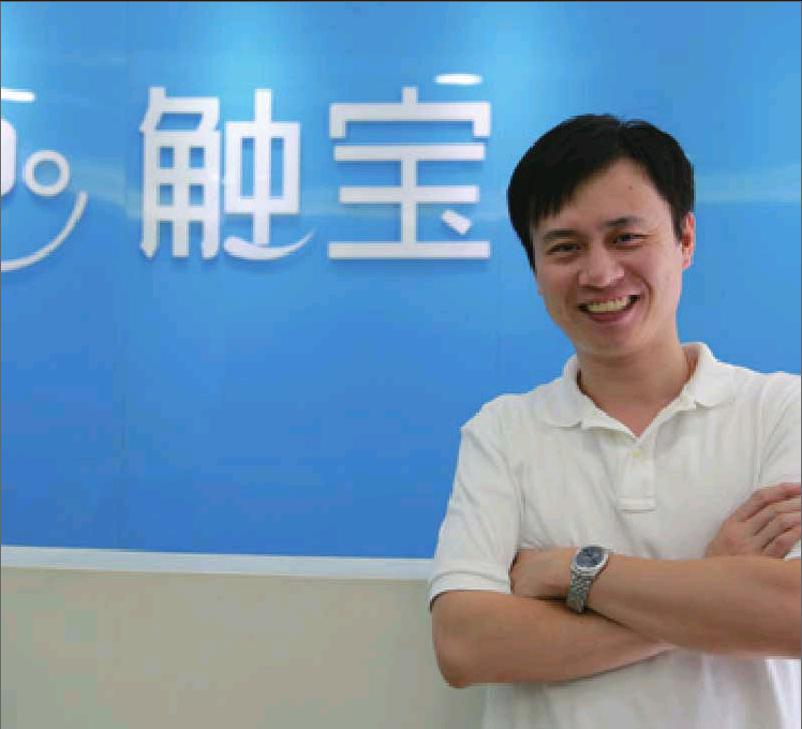An Original Innovator
2016-04-27ByMaLi
By+Ma+Li

Articulate, confident and strategic—these words aptly describe Wang Jialiang, joint founder and CEO of Chubao Technology, a Shanghai-based smartphone app developer.
The companys Chubao input method can support over 100 languages and is available to users in more than 130 countries and regions, accounting for 20 percent of the Android smartphone market share.
The product is capable of correcting mistakes, inputting Chinese and English simultaneously without switching modes, and handwriting, among other creative functions.
“I hope our team can develop more products in order to influence the world and change peoples lives, as well as setting an example for entrepreneurs in China,” Wang said.
A success story
After receiving a masters degree in electronic engineering at Shanghai Jiao Tong University in 2005, Wang went to Germany to work while touring around Europe.
He found a job with Golden Sachs there.“I didnt have plans to stay there long term. My purpose was simply to find future business partners,” Wang told Beijing Review.
A colleague at the investment bank suggested he should go to work for Microsoft in order to find a suitable business partner and accumulate experience in project management. The colleague also gave him the contact of Alex Chan, President of the Microsoft Asia-Pacific Research and Development Group.
After a four-month stay in Germany, Wang resigned from Golden Sachs, which offered him a yearly salary exceeding $92,000, and returned to China.
When he met Chan, Wang was asked about his career plans for the upcoming five years. “I told him, ‘I dont know where I will be in five years, but I am sure that I will not be at Microsoft anymore.” Wang recalled.
Chans reply even surprised Wang, “No problem, maybe we will be starting a business together in five years.”
Wang joined Microsoft as a project manager, responsible for developing and designing Windows servers and relevant development tools. He admitted that the project management experience accumulated at a big corporation like Microsoft had laid a solid foundation for him to start his own business later.
Then in 2007, Wang was on a business trip to the United States when the first-generation iPhone went on sale.
“The touchscreen iPhone looked cool and its input method revolutionized the keyboard input method of traditional phones; however, the user experience was mediocre,” Wang noted. The coincidental rendezvous with the iPhone helped Wang determine the focus of his entrepreneurship.
“Back then few people in China had any idea about smartphones. Nevertheless, the first time I saw the phone produced by Apple, I believed smartphones would dominate the market in the future,” Wang said. He realized that a handy input method would be the first step for smartphones to win over customers.
In 2008, Wang and his colleague, Zhang Kan, quit their jobs at Microsoft and started Chubao Technology in a small rented office in Shanghai. A classmate of Zhangs from university and another colleague from Microsoft also joined the project.
They then developed input software for English. However, as there was no app store back then, they had to set up an English website and uploaded the input method for users to download on their computers and then transmit to their phones for installation. It was very inconvenient.
Wang said that they had expected the software to be downloaded only 1,000 times per month in the beginning. Much to their surprise, however, it was downloaded over 100,000 times within the first two weeks of its release. The developers gained confidence from the vast user base.
As Wangs website was in English, Tech.sina. com, which published an article on the new input method three weeks after its launch, even mistook his company for an American one. To avoid misunderstanding, Wang and his team named the input method as Chubao. The app won prominent accolades in the year it was launched.
Chubao won the 2009 Mobile Innovation Global Competition of the GSMA (the representative body of the world mobile industry), becoming the first ever Chinese enterprise to obtain the title.
The win has also garnered more attention and favor for Wangs product from many telecom operators in Europe. “German Telecom installed our input method on the first Android phone produced by Huawei. The biggest telecom operator in Europe said that our product had won their respect and expressed an inclination for cooperation,”Wang said.
With confidence and sensitivity for the market, Wang and his team had achieved their first career success.
Defending rights
However, in 2012, when Wangs company was doing well overseas, an unexpected obstacle appeared.
In March 2012, a leading American tech firm called Wang and offered to purchase his company.
“In foreign countries, when companies like ours occupy a certain portion of the market share, most of them are acquired by industry leaders or other listed companies,” Wang said.

After Chubao refused the offer, the American company sued it at a local court for an alleged intellectual property rights violation and later submitted the case to the U.S. International Trade Commission.
Wang said that the accusations were entirely groundless, since his company had attached great importance to intellectual property and patent rights since its inception. “For the first 1 million yuan ($154,000) we made, we took out 400,000 yuan ($61,880) for patent application and protection. Every part of our products is proprietary,” he claimed.
Wang understands the importance of intellectual property rights if his company wants to expand overseas.
In the face of the lawsuit, Wang said that he had only two options: Win the lawsuit and pay$8 million for lawyers; or refuse to go to court, resulting in Chubaos products being banned from the U.S. market from then on.
Wang opted for the former. He chose a leading law firm in the United States to defend his company.
“The law firm had defended HTC and Apple in patent infringement cases. In the United States, many lawyers are needed for one case. The plaintiff hired 12 lawyers for the case, however, I only hired two in order to minimize costs,” said Wang.
At first the chairman of the law firm didnt agree to defend the case with only two lawyers. However, Wang persuaded him by citing an ancient Chinese anecdote in which the weaker opponent triumphed over the stronger one in a horse race by using proper strategies.
Later, when Wang was required to hand over the e-mail messages he had sent and received in recent years to the plaintiffs lawyers, his lawyers told him only to select those favorable to him. However, as Wang was confident about winning the case, he decided to send all of his e-mails to the opponents lawyers. The move, which should have been beneficial to the opponent, became a headache for the plaintiffs lawyers, because the messages were all in Chinese and it would take a year to translate them into English.
Then Wang hired a top intellectual property expert in the United States as his companys consultant.
Three months later, the court announced that one patent lawsuit filed by the American company was invalid. Later, similar rulings were made on three other suits. When only one suit remained, the accuser felt no hope of winning and therefore dropped the case.
“Although it cost me several million dollars to fight the case, I successfully defended my intellectual property rights and won respect from the industry. Chinese companies doing business overseas should have the confidence to defend themselves when they have done nothing wrong,”Wang said.
In 2010, Wangs company launched the Chubao call service free of charge. Ever since its launch, the product has attracted over 200 million users, among which 50 million are active users. It has also won the prestigious prize of the Mobile Internet Innovation Competition, organized by China Telecom in 2012.
